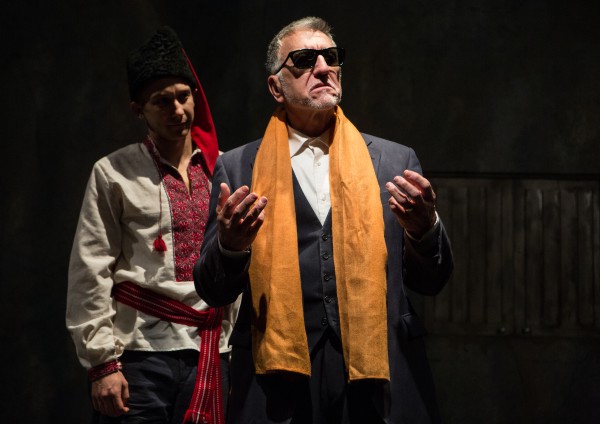Play about 2004 Orange Revolution shows complexity of the country

Ken James Stewart, Scott Wentworth (the kobzar) at Wormwood / Tarragon Theatre | Photo: Cylla Von Tiedemann
Ukrainian, gay and curly-haired, Andrew Kushnir brings his new play Wormwood to Tarragon theatre.
The play, which tells a story of a Canadian man traveling to Ukraine shortly after the Orange Revolution of 2004, portrays Kushnir’s favourite character, an outsider.
“I identify as a queer writer,” said Kushnir, sitting in one of the back rooms at Tarragon during the rehearsal of Wormwood. Even though it’s a straight couple that has a love story in the play, “my curly-haired, gay, Ukrainian soul can’t help but write something that has a little bit of that perspective and that sense of what it means to be an outsider,” he adds as some disturbing music starts to play.
Growing up in the Ukrainian diaspora, Kushnir was taught to love that country, but it wasn’t until 2004 when he realized it is a real place.
“2004 was a moment where I felt Ukraine was very visible to the world,” said Kushnir. “You had really incredible images coming out of the country.”
Years later, thinking when to set a play, it seemed like a very obvious point in time. These days, unconsciously putting Ukrainian words in his speech, Kushnir is definitely still in love with the country.
He didn’t start writing the play right after the revolution happened. It took a lot of research, reading biographies and memoirs, talking to Canadian observers and a trip to Ukraine in 2011 before everything fell into place.
Although a lot of things came about in Ukraine since 2004, including another revolution, he was interested in that first moment when Ukrainians demanded change.
“I still think it was a significant moment,” said Kushnir. “Besides, I think the stories of the place are long stories,” he adds, referring to corruption, mistrust of police and politicians and Russian propaganda in Ukraine in 2004. “Ten years later – what has changed?”
However, a few things have changed. Visiting Lviv, Kiev and Zaporozhye in 2011, collecting people’s experiences and talking to activists, he noticed more awareness and connection. The regionalism, on the other hand, is still an issue and it is depicted in Wormwood, where characters speak not only English but Russian and Ukrainian.
Kushnir also did interviews with LGBT activists in Ukraine. “For a long time I thought there is no such thing as a gay Ukrainian,” he said. Although there is more cultural anxiety, ignorance and tension, “It’s like in the early 80s in terms of the fight for rights,” he said about people he met who are at the forefront of that battle. “It was moving and inspiring to me and filtered into the play.”
“I am hopeful for change, I really support my friends that are activists in Ukraine but I realise it’s going to take time.” Not positioning himself as an activist, Kushnir knows his work was identified as activist theatre. “I am interested in political questions and questions of justice and can’t help but put it into my work.”
For Kushnir the easiest part of creating Wormwood was writing the character of the kobzar, a nomadic Ukrainian balladeer, who narrates the story. “It was easy to write him because I hear my grandfather’s voice.”

